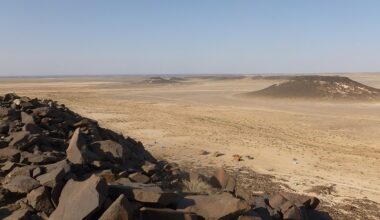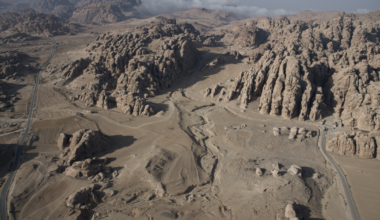Project summary
The OPOF project focuses on promoting the cultural heritage and history of the Wadi Faynan through initiatives to increase the eco-tourism in the region and widen the knowledge of the area among the local communities.
See the Faynan Heritage website for more information and updates on this and other related Faynan projects.
Project details
Location: Jordan
Year(s): 2019-2022
Principal Investigator: Prof. Steven Mithen (University of Reading)
Co-investigators: Dr Fatima Al-Nammari (University of Petra); Dr Jessica Jacobs (Queen Mary, University of London); Dr Gehan Selim (University of Leeds); Dr Fatma Marii (University of Jordan)
OPOF Project Manager in Jordan: Nebras Maslamani
Lead and partner institutions and funding:
- University of Reading (Lead Research Organisation)
- Department of Antiquities of Jordan
- Ministry of Tourism and Antiquities
- University of Petra
- Queen Mary, University of London
- University of Leeds
- University of Jordan
- Council for British Research in the Levant (CBRL)
- Arts and Humanities Research Council (AHRC)
- Newton-Khalidi Fund
See: here for the OPOF entry on the UKRI gateway to publicly funded research and innovation.
Project description
More than 800 Bedouin families live in the villages of Faynan and Greigra in Wadi Faynan (southern Jordan, 52 kilometres from Petra), and the region is considered an economically deprived area, with pastoralism and irrigation-based farming providing livelihoods for members of the five Bedouin tribes who live there.
The Wadi Faynan has an accumulation of human history from 500,000 years ago to the present day. Tourism in this distinctive desert region has increased in recent years, reaching more than 8,000 visitors in 2019.
CBRL has been involved in archaeological and community research projects in the Faynan region for more than 30 years. In March 2019, as part of the Faynan Heritage initiative led by the University of Reading – in partnership with the Department of Antiquities in Jordan (DoA), the University of Leeds, Queen Mary University of London, the University of Jordan, the University of Petra, and CBRL – the OPOF project was launched.
Funded by the Newton-Khalidi Fund, administered through the UK’s AHRC, the project returns the knowledge gained from previous and ongoing research on Faynan’s cultural heritage to the communities who live there. The opening of the Faynan Museum in March 2018, and CBRL’s previous project in partnership with the University of Reading ‘Discovering Wadi Faynan 16 and Faynan heritage’, funded by the AHRC, helped to develop exhibits for the museum. Community engagement is needed for the region’s people to deepen their understanding of this heritage and to promote eco-tourism.
The project involves six sub-projects to:
1. Co-create an enhanced gallery space to include representation of the last 100 years of Faynan’s history within the museum
2. Facilitate members of the local community to tell their own history and stories about Faynan in their own way, and represent this within the museum.
3. Support the six schools in Faynan to develop an awareness and understanding of Faynan’s cultural heritage and embed this into the learning and teaching
4. Connect the museum to the landscape by installing information boards at a further 20 archaeological sites,
5. Make accessible the archaeological sites of Faynan to those who cannot visit Faynan or cannot access the sites in its remote areas by using photogrammetry to document and digitally represent the sites within the museum and on the Faynan heritage website
6. Enable the museum to become a community hub by designing social and play space for adults and children in its immediate vicinity.
Project bibliography
Mithen, Steven. 2018. Faynan Heritage: A celebration and archaeological guide. Creative Commons Attribution 4.0 International License.
Maslamani, Nebras. 2021. Our past, our future, all together in Faynan (OPOF): Promoting women’s economic empowerment, eco-tourism and education in southern Jordan. Bulletin of the Council for British Research in the Levant 2020, p 23-24.
Also, see the project entry on the University of Reading’s website here.
Published:13 December 2021















